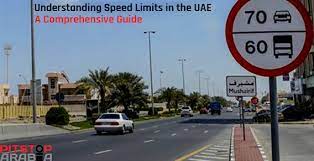
Introduction
The UAE is known for its excellent road infrastructure, but adhering to speed limits is crucial for safety. This guide provides a comprehensive overview of UAE speed limits in different emirates, types of roads, and vehicles. Understanding these limits will help you avoid traffic fines and contribute to safer driving conditions.
Speed Limits in Dubai
Dubai generally has a speed limit of 120 km/h on major highways. However, it’s essential to pay attention to specific road signs as limits can vary based on road conditions and traffic. Residential areas typically have lower speed limits, often around 60 km/h.
Speed Limits in Abu Dhabi
Abu Dhabi is known for having higher speed limits compared to other emirates. Major highways often have a speed limit of 140 km/h or even 160 km/h on specific stretches. However, it’s crucial to observe the posted speed limits as they can change frequently.
Speed Limits in Other Emirates
While Dubai and Abu Dhabi have the highest speed limits, other emirates like Sharjah, Ajman, and Ras Al Khaimah generally have speed limits of 120 km/h on highways. It’s essential to check the specific speed limits for each emirate as there might be variations.
Speed Limits for Heavy Vehicles
Heavy vehicles, such as trucks, buses, and minibuses, have lower speed limits compared to passenger cars. These limits are typically displayed on road signs and vary depending on the road type. Adhering to these limits is crucial for safety.
Tips for Safe Driving
- Pay attention to speed limit signs: Always obey the posted speed limit.
- Use cruise control: Maintain a steady speed to avoid accidental speeding.
- Be aware of road conditions: Adjust your speed based on weather, traffic, and visibility.
- Leave ample distance: Maintain a safe following distance to react to sudden stops.
- Avoid distractions: Focus on the road and avoid using mobile phones while driving.
FAQs
Q: What is the general speed limit on UAE highways? A: The general speed limit on UAE highways is 120 km/h, but it can vary depending on the emirate and specific road conditions.
Q: Are there speed cameras in the UAE? A: Yes, the UAE has a comprehensive speed camera network to enforce speed limits.
Q: What are the penalties for speeding in the UAE? A: Penalties for speeding in the UAE vary depending on the severity of the violation and can include fines, black points, and vehicle impoundment.
Q: Can I use cruise control in the UAE? A: Yes, you can use cruise control, but it’s essential to remain alert and adjust your speed as needed.
Q: Are there different speed limits for night driving? A: While there aren’t specific night driving speed limits, it’s generally recommended to reduce speed at night due to reduced visibility.
Conclusion
By understanding and adhering to UAE speed limits, you can significantly reduce the risk of accidents and traffic fines. Safe driving practices not only protect yourself but also contribute to the overall safety of the road for everyone.
PitstopArabia is committed to providing you with essential information to make your driving experience in the UAE safe and enjoyable. Visit our website for more tips and advice.